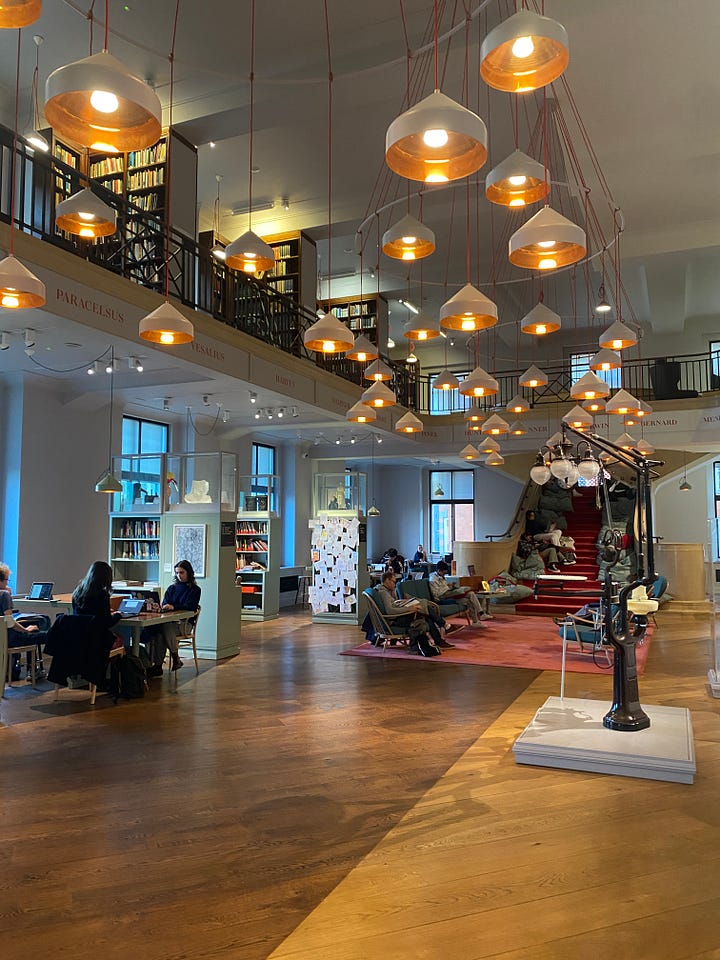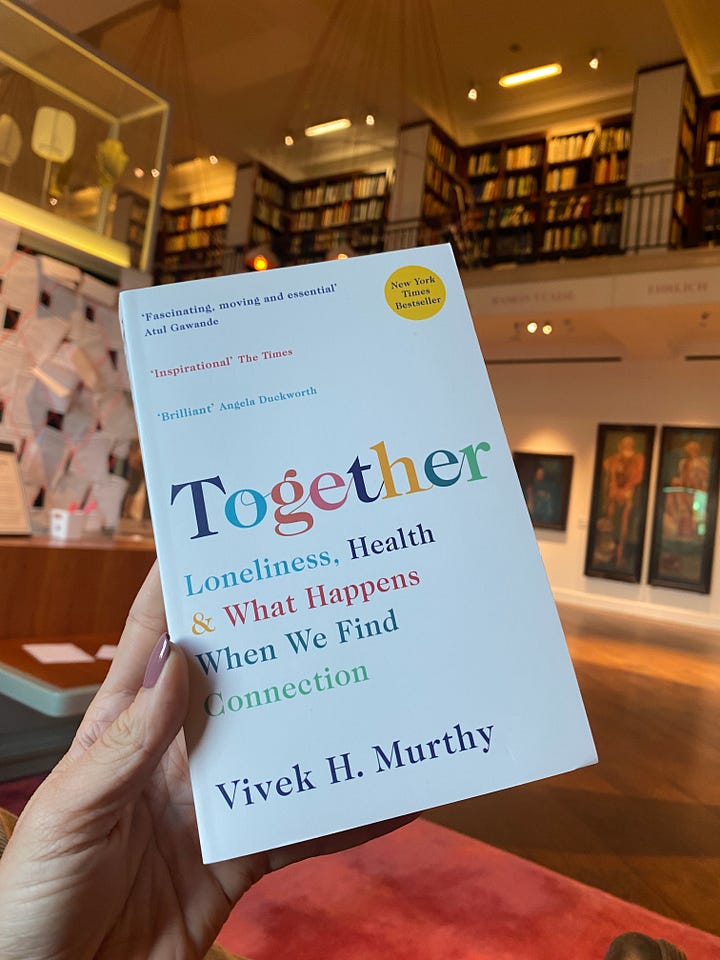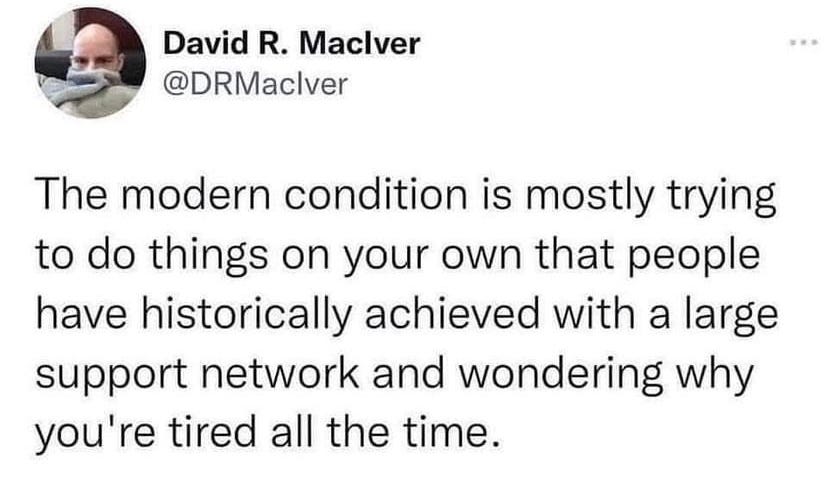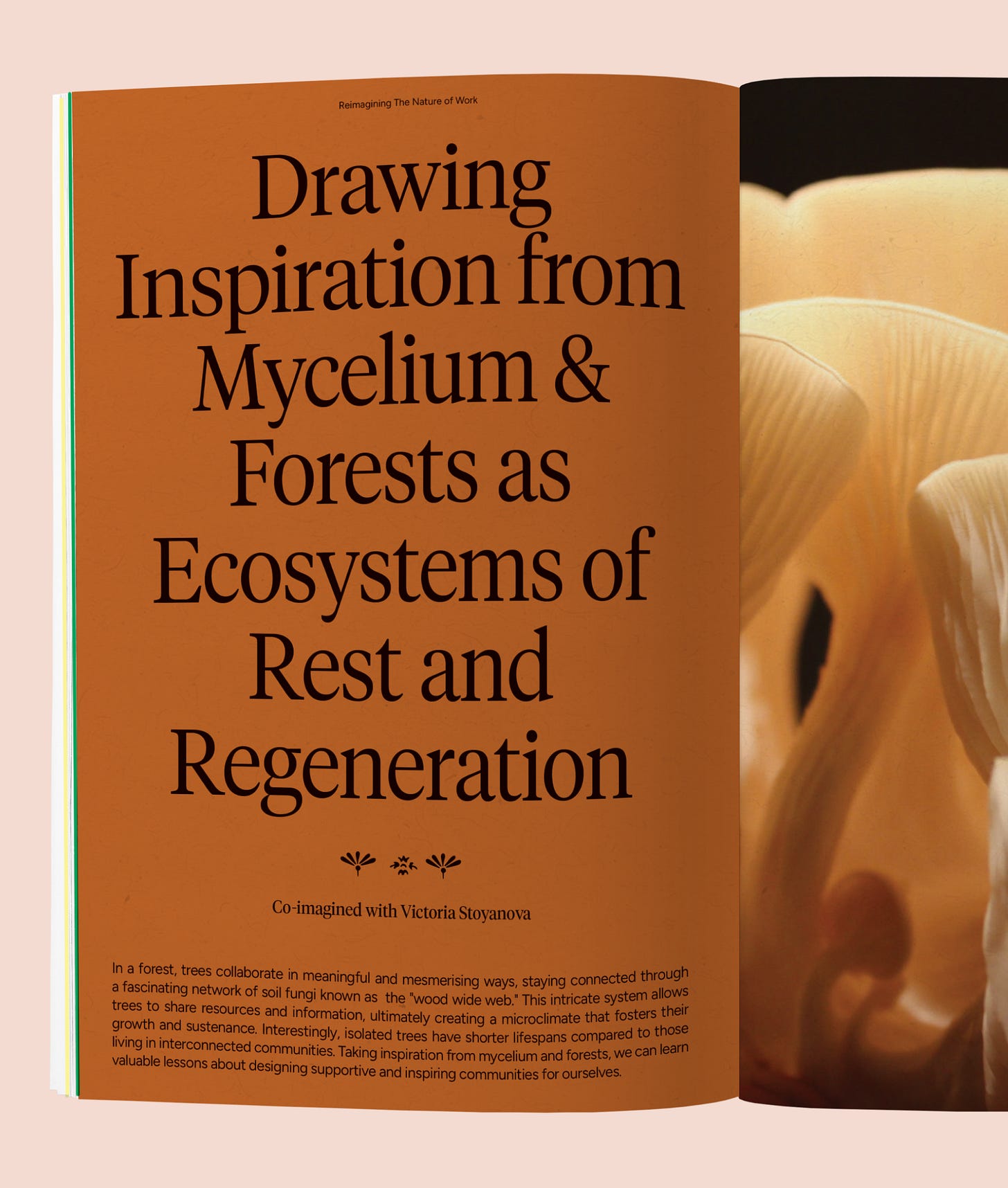Rekindling Neighborhood Bonds: Combatting Collective Loneliness and Fostering Community Care in a Modern World
The warm, cozy neighborhood feeling and creating space for rest and regeneration.
In our modern world, burnout is one of the biggest struggles, and loneliness might be a huge contributor to this burnout and collective exhaustion.
Recent conversations with friends and collaborators have revealed a common thread: we’re lacking something, that could be described as a warm, cozy neighborhood feeling.
After picking up the book “Together” from US Surgeon General Vivek Murthy at the Wellcome Collection in London, and reading its first pages in their beautiful open space and free library, the theme of Collective Loneliness got stuck with me and found its way into many recent conversations.
The book delves into the "loneliness epidemic" perpetuated by modern cultures that elevate the narrative of the rugged individualist and self-reliance, particularly prevalent in professional environments.


Murthy’s anecdotes from Ethiopian and Indian cultures, where mutual care and strong community bonds are the norm, illustrate a profound sense of community that many of us long for.
In his book, he describes a conversation with a young man originally from Ethiopia, now living in DC. He writes “What he was missing most about his hometown was that people around you there took care of you, and you did the same… “We cook for each other, we take care of each other’s kids, and we spend time together.”
Murthy shares another anecdote that stuck with me. His parents, growing up in India, had similar traditions, and an equally close-knit community network. “When I used to stay at my great-grandmother’s house in Bangalore as a child, spontaneous drop-in visits from friends and extended family were daily occurrences. Whether or not we were related to them, my sister and I were encouraged to call everyone “uncle” and “aunty”. This made it seem as if we were all part of one enormous family. Later as an honorary uncle myself, I discovered that this practice has a reciprocal bonding effect; whenever a child calls me uncle today, I feel both more connected to and more responsible for a child.” THIS 🫂🧡
Similarly, I recently learned about a forgiveness ritual in Hawaiian culture. “Ho’oponopono” – is usually carried out in family or community gatherings, where an individual’s problem is laid out, and the collective works through that problem as if it was their own; there is no separation between the individual and the collective.

Addressing loneliness involves understanding its three dimensions:
Intimate Loneliness – the longing for a confidante or intimate partner
Relational Loneliness – the yearning for quality friendships and social support
Collective Loneliness – the hunger for a network or community with shared purpose and interests
Also important to note, it’s crucial to distinguish loneliness from solitude, a state of peaceful aloneness that fosters personal growth and well-being.
It's vital to recognize that reducing loneliness isn't solely about deep relationships; both deep and shallow interactions, strong and weak ties, are necessary, as
elaborates in a recent newsletter (some great research over there, highly recommended for a deep dive into this topic.)In our modern-day lives, especially post-pandemic, friendships and connections have grown even more complex and led to a new duality: vibrant virtual networks contrasted with more tangible local community ties.
My personal experience of being a global citizen echoes this statement from Severin Matusek from an event earlier this year:
“I'm thinking a lot about the fact that 99% of my work life and professional value creation exists in virtual space. My screen is the portal to a virtual world that I contribute to and that enables me to collaborate on exciting projects around the world. But the result of my work does not influence my physical environment. … I don't lack social connections in my life. But my physical self, the one that lives in Berlin, goes grocery shopping, picks up his kid, and hangs out with friends, doesn't overlap much with my virtual self, the one that creates value through the portal of a screen, anymore.”
Since having worked and lived in NYC for the past years, living remotely for some time, and recently having relocated to London, most of my professional network, work and some of my closest friends are in the US and other parts of the world. So while I don't lack social connections and community in my life and love my global network, I do feel the need for more tangible local community ties. The neighborhood-y, cozy, in-person, and family-like connections and feeling of being embedded.
Where did we get lost?
Technology-driven interactions often replace meaningful human contact.
Technology has reshaped our interactions, often at the cost of genuine human contact. In pursuit of convenience, we've turned to impersonal solutions: quick take-out coffees, delivery services with minimal contact, and even hiring nannies online. This inadvertently trades the close family and neighborly bonds of the past for a community-for-hire approach.
Work dominates our lives, leaving no room for community involvement.
Probably the biggest and underlying problem with all of this, is, of course, work.
hits the nail on the head: “Not just normal work, but all-consuming work, slippery work, work that becomes the central axis of our lives.”This overemphasis on work leaves little room for community engagement or participation. And while sports or gardening clubs were more normalized in previous generations, a recent survey we ran suggests, that nowadays, personal and societal expectations make us prioritize productivity over the joy of participating in things outside of work. With that, as Petersen writes, we spend the small amount of energy we have either on optimizing ourselves (exercise, skin care, “self-care”) or on our very close familial circle. ugh 😑
WFH, despite its flexibility, can lead to isolation without variety and connection.
While the benefits of flexibility in how and where we work are well-documented, Working From Home can lead to isolation without variety and connection. True flexibility lies not in the mere substitution of our homes for offices, but in infusing our lives with variety and connection. The challenge is, that there still aren’t good solutions for this way of working in our hybrid world.
How can we reestablish a support system and connective tissue between us?
Learning from Nature
In our recently published booklet "Reimagining The Nature of Work," we draw inspiration from nature. Forests, interconnected through a "wood wide web," exemplify this concept, where trees in communities live longer than isolated ones. These networks highlight how we need to design supportive communities, offering a sense of support and belonging crucial for mental and emotional nourishment.
Smile at a stranger 🙂
Tiny neighborly interactions can brighten your mood and have an impact on someone else. Greeting your bus driver, for instance, has a small positive impact on drivers' well-being. Having tested this myself, I can confirm the magic of this.
Embracing Collective Mindsets
In a “Collective Imagination” session we hosted earlier this year, our community highlighted the need for a shift of operating from a mindset of competition, fear, and comparison, to cultivating an abundance mentality that recognizes the vast opportunities and resources available to us. Adopting a collective mindset not only alleviates isolation but also reduces the stress of solo striving. UME Collective, who we interviewed in the booklet articulates this beautifully: embracing a collective mindset fosters a healthy ecosystem where work flows smoothly, and we're reminded that we're stronger together, never truly alone.
Can you offer mentorship or support to a colleague or someone in your field who is just starting out? Or think about a challenge you’re currently trying to solve. Is there someone you can reach out to and ask them for their co-thinking?
Work Models that Integrate Rest & Regeneration
In the booklet, we also explore how to create workplaces that nurture connections and examine work models that integrate life and rest. We're inspired by education's seasonal nature, which allows for personal growth and holistic development: "Summers and holidays provide opportunities to travel, visit loved ones, volunteer, or pursue hobbies, offering space for holistic personal growth," shares Jenessa Gerber, a traveler, teacher, and union leader.
Organize a co-working meetup to offer variety and prevent isolation.
Flexibility in work shouldn't mean isolation at home. Last week we hosted our first coworking meetup. We picked a work-friendly coffee shop, gathered a small group, and spent a couple of hours together. If you’re keen on hosting a meet-up in your city, feel free to leave a comment below or reach out!
Coming up: OOO Seasonal Salon x Community, Rest and Regeneration 🍂
After the launch of our booklet Reimagining The Nature of Work, we’re excited to host a first conversation around some elements of it.
As we’re shifting into a slower season, join us for a collective imagination to dive deeper into this topic, reflect on the year gone by, and look ahead to what's next.
With our booklet we’re hoping to encourage more conversations around these themes and bring them into your own homes. We’re hosting a first, small in-person salon in London later this month, and will share some tips and tricks on how to host more meaningful gatherings and conversations around the themes of the booklet in our next newsletter.
Thank you so much for reading this newsletter and for being here!
Best,
Alice








As a remote worker (going on 5+ years, 3 working for myself) who's passionate about social health, I relate to that quote from Severin so much!
Great post! Would love to connect/get involved.